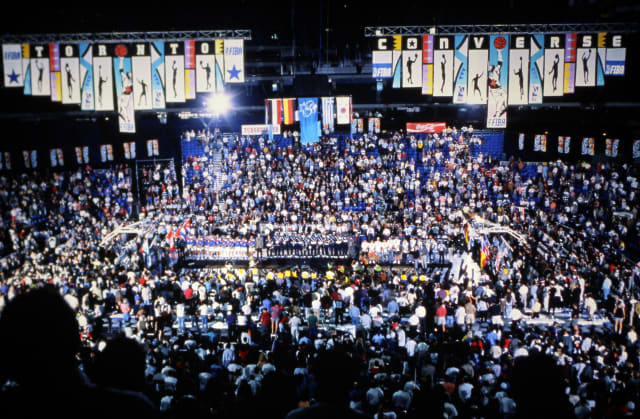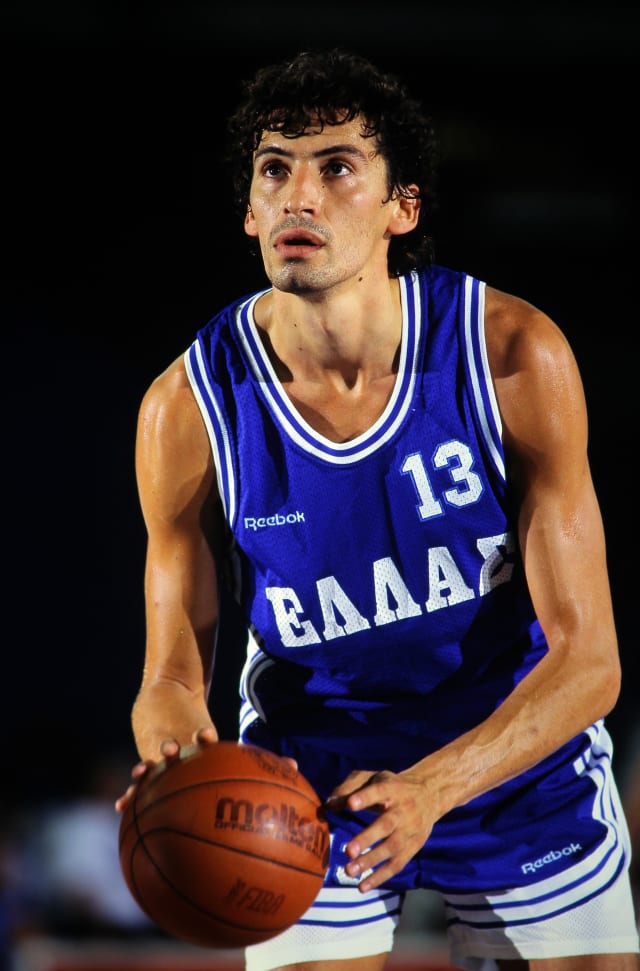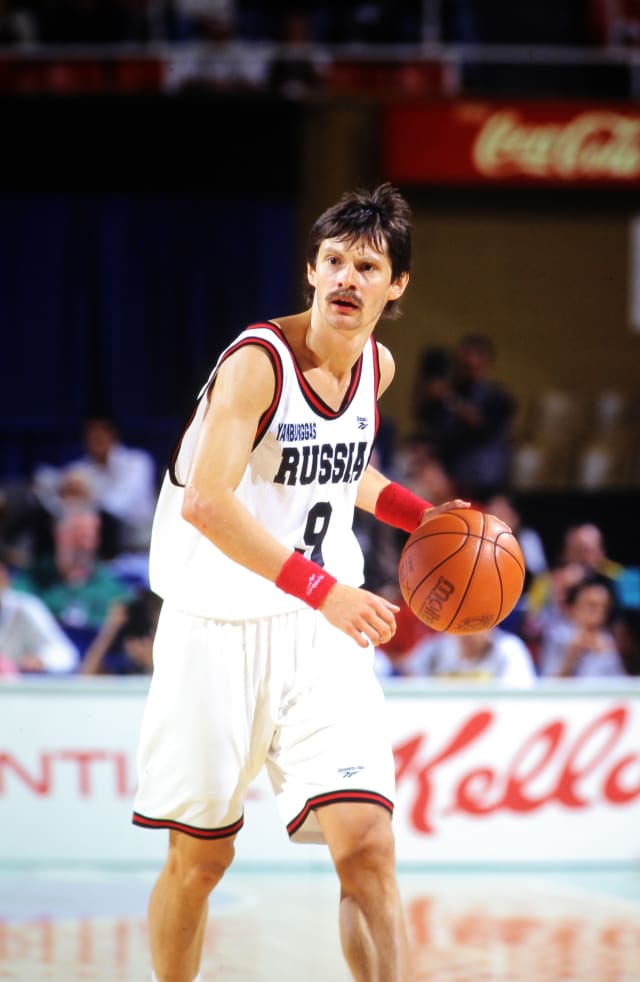The Best of 1994 World Cup: Dream Team II gives USA third title
The FIBA Basketball World Cup 1994 was hosted by Toronto, and the Dream Team II dominated as USA claimed a third world crown. Russia and Croatia were second and third, respectively.
MIES (Switzerland) - The FIBA Basketball World Cup 1994 was hosted by Toronto, and Canada put on a great show which was aided by the Dream Team II dominating as USA captured the crown for a third time, leaving Russia and Croatia to take second and third places.
On the heels of the original Dream Team's power display at the 1992 Olympics, the first World Cup with USA players from the NBA had little trouble pulling even with Soviet Union and Yugoslavia on three World Cup titles each. Among the other highlights were a 20-year-old Steve Nash showing glimpses of future greatness and Andrew Gaze leading the tournament in scoring for Australia.
The best team: USA
| Rank | Team | W-L |
| 1. | USA | 8-0 |
| 2. | Russia | 6-2 |
| 3. | Croatia | 7-1 |
| 4. | Greece | 4-4 |
| 5. | Australia | 5-3 |
| 6. | Puerto Rico | 3-5 |
| 7. | Canada | 4-4 |
| 8. | China | 2-6 |
| 9. | Argentina | 5-3 |
| 10. | Spain | 5-3 |
| 11. | Brazil | 2-6 |
| 12. | Germany | 5-3 |
| 13. | Korea | 3-5 |
| 14. | Egypt | 1-7 |
| 15. | Cuba | 3-5 |
| 16. | Angola | 1-7 |
FIBA brought the World Cup to North America for the first time in 1994 with Canada welcoming the globe and Toronto and Hamilton hosting games from August 4-18. NBA staff helped the 12th edition of the World Cup become one to never forget with entertainment being at an all-time high in the event and Toronto games being played in the SkyDome, which had capacity of up to 70,000 people as a baseball stadium and registered a World Cup record 32,616 spectators for the Final.
The field once again included 16 teams: the hosts Canada; Olympics winners USA; the top five qualified teams from Europe - Germany, Russia, Croatia, Greece and Spain; the top four qualified nations from FIBA Americas - Puerto Rico, Argentina, Brazil and Cuba; the top two sides from Asia - China and Korea; Africa's top two teams - Angola and Egypt; and Oceania winners Australia.
The 16 teams were drawn into four groups of four with the top two finishers after round robin play going into a second group phase with two groups of four nations. After three more games, the top two teams from the groups crossed over for the Semi-Finals and then the Final.

The 1994 World Cup was also the first in which USA players in the NBA could play - following their first major event at the 1992 Olympics and the Dream Team. The " Dream Team II" included NBA superstars such as Alonzo Mourning, Dominique Wilkins, Dan Majerle, Reggie Miller, Mark Price and Shaquille O'Neal.
USA, Croatia and Russia all rolled to 3-0 records in their respective opening groups. In Group A, China joined USA in the second group stage as they fought back from a 15-point halftime deficit to beat Spain 78-76. Australia were second in Group B but only after surviving a comeback by Korea, who were down 15 points at halftime but lost 87-85. And Group C's second placed team was Canada. There was a three-way tie atop Group D with Greece, Puerto Rico and Germany even at 2-1. The Germans were condemned to third place as they lost to Greece by 10 points - thanks to 18 points and 10 rebounds from Panagiotis Fassoulas.
 Panagiotis Fassoulas
Panagiotis Fassoulas
USA and Russia were the clear top two teams in Group I with the Americans rolling over Russia 111-94 to take the top spot. Croatia had no trouble in Group II with three wins while Greece fought past Canada 74-71 to reach the Semi-Finals.
Russia surprised Croatia in the first Semi-Finals with a 66-64 victory thanks to Sergej Bazarevich scoring 16 points. The second Semi-Final wasn't close as USA blasted Greece 97-58 with a superb defensive effort. Reggie Miller scored 14 points to pace six USA players in double figures and Shaquille O'Neal added 9 points and 16 rebounds. In the game for third place, Dino Radja scored 22 points and Arijan Komazec had 21 points in a 78-60 win over Greece.
The Final between USA and Russia was another blowout as the Americans led 73-40 at halftime en route to a 137-91 victory. USA hit 16 of their first 17 shots and eight players scored in double figures, topped by Dominique Wilkins' 20 points and O'Neal collected 18 points and 10 rebounds.
The best player: Shaquille O'Neal, MVP
Shaquille O'Neal was an immovable force for a USA team that rolled through the competition with a 37.8 point average winning margin. O'Neal averaged 18.0 points and 8.5 rebounds in less than 18 minutes per game while shooting 71.3 percent from the field, leading the team in scoring and rebounds and taking home Most Valuable Player honors.
Shaq eased into the tournament with 12 points and 6 rebounds versus Spain and then had 22 points and 5 rebounds against China. O'Neal pushed around Brazil with 27 points on 12-of-15 shots to go with 11 rebounds.
O'Neal collected 6 points and 4 rebounds in just 11 minutes in the opening game of the second group stage against Australia. He bounced back with 29 pointy and 7 rebounds in a win over Puerto Rico, and he finished the stage with 21 points and 9 rebounds in just 18 minutes against Russia. O'Neal picked up 9 points and 16 rebounds in a Semi-Finals win over Greece and finished the competition with 18 points and 10 rebounds in a blowout 137-91 victory over Russia in the Final.
O'Neal was joined on the All-Tournament Team by teammates Reggie Miller and Shawn Kemp as well as Sergej Bazarevich of Russia and Croatian Dino Radja.
The best game: Russia v Croatia - Semi-Finals
Soviet Union and Yugoslavia had each made the podium of the last eight World Cups dating back to 1963 - both winning three world titles. But neither country was in Canada. Still, the remnants of both powerhouses were in Toronto and Croatia came into the World Cup expecting to win at least the silver medal two years after losing to USA in the 1992 Olympics Final. Russia meanwhile were playing their second major tournament following FIBA EuroBasket 1993, where they finished second.
In the 1994 World Cup Semi-Finals, Russia were hit with a major injury after just 4 minutes as Andrej Fetisov landed akwardly on his ankle and he was lost for the game - including his 11.7 points per game coming into the contest. Sergei Bazarevich managed to give Russia a 12-6 early lead and Vasily Karasev helped the Russians surge ahead consistently the whole first half and lead 31-22 at the break. That was thanks to Croatian star Dino Radja making just 1-of-10 shots from the field and 4-of-10 free throws.
Dmitri Domani stepped up for Russia early in the second half and the advantage swelled to 14 points - 39-25. Croatia hit two three-pointers to slowly get back into its offense and Radja sandwiched baskets around 8 points from Arijan Komazec and Croatia were within 48-47.
 Sergej Bazarevich
Sergej Bazarevich
Bazarevich found the answers at the other end and the cushion grew to 56-49. Croatia came back again with triples from Danko Cvjeticanin and Toni Kukoc and got within 60-59. Sergej Babkov punched back with a big basket and Evgeny Kisurin made 4 free throws to give Russia a 65-59 lead with 74 seconds to go and they held on.
Bazarevich finished with 16 points, Babkov had 13 and Karasev added 11 points. Komazec picked up 22 points for Croatia and Radja ended with 16 points while Kukoc struggled with just 5 points on 2-of-8 shooting.
The best story: Steve Nash shows his future star potential at age 20
Canada were hosting the World Cup for the first time and the world had a future superstar to enjoy in the Canadian ranks as Steve Nash was making his FIBA debut at just 20 years of age.
Canada's roster was led by future three-time NBA champion Rick Fox, who had been playing three seasons in the NBA with Boston; two-time NBA champ Mike Smrek, and Greg Wiltjer, who was playing his third World Cup and was also at the 1984 Olympics.
Nash was still two years from being drafted in 1996, but he grew into his role with the team. After a combined 17 points and 5 assists in the first three games, Nash scored 13 points to go with 4 rebounds and 4 assists against Greece. His other strong game was the final matchup against China in which Nash picked up 7 points, 8 assists and 4 steals.
The best performance: Andrew Gaze
Andrew Gaze was 29 years old and still in his prime when he was playing his third World Cup for Australia after scoring 14.8 points in 1986 and 24.2 points per game in 1990. After finishing fourth in scoring in 1990, the points machine topped the scoring list in Toronto with 23.9 points per game.

The guard lit up Korea with 31 points to start the tournament and poured in 30 points the next game against Cuba, including making 15-of-15 free throws. Gaze picked up 19 points in an Australian loss to Croatia and then bounced back with 23 points against USA. Gaze tallied 17 points in a third straight loss to Russia and then then stepped up with 34 points in beating Puerto Rico.
In the Classification 5-8, Gaze scored 11 points versus China and finished the tournament with 26 points in another win over Puerto Rico to help the Boomers to a fifth-placed result.
Stats leaders
Points
| Player (country) | Points Per Game |
| Andrew Gaze (Australia) | 23.9 |
| Dino Radja (Croatia) | 22.4 |
| Arijan Komazec (Croatia) | 19.4 |
| Jae Hur (Korea) | 19.4 |
| Paolo De Almeida (Brazil) | 19.4 |
Rebounds
| Player (country) | Rebounds Per Game |
| Stojan Vrankovic (Croatia) | 9.4 |
| Fernando Martinez (Spain) | 8.9 |
| Hansi Gnad (Germany) | 8.8 |
| Shaquille O'Neal (USA) | 8.5 |
| Dino Radja (Croatia) | 8.5 |
Assists
| Player (country) | Assists Per Game |
| Marcelo Gustavo Milanesio (Argentina) | 6.9 |
| Toni Kukoc (Croatia) | 6.8 |
| Jae Hur (Korea) | 4.5 |
| James Carter (Puerto Rico) | 4.1 |
| Kevin Johnson (USA) | 3.9 |
FIBA